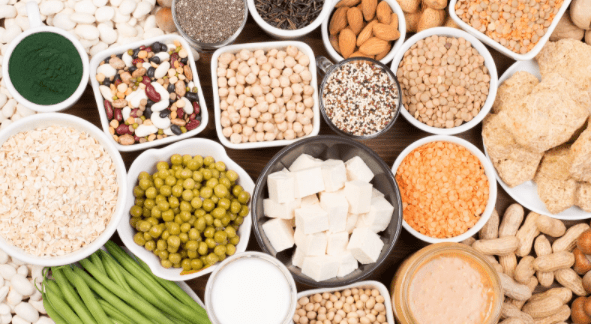Here’s Why You Should Eat Plant-Based Protein
New Delhi: The term “plant-based” describes a diet rich in foods that come from plants, ideally eaten in whole-food or minimally processed form. A plant-based diet is made up mostly of vegetables, fruits, legumes (beans), nuts, seeds, tubers (potatoes, among others), and whole grains. “Animal-based”, on the other hand, refers to a diet concentrated in animal products: meat, dairy, eggs, and so on.
Plant Protein Is Animal-Friendly
One of the best reasons to adopt a plant-based diet is that it’s a compassionate choice. For many people, the idea of veganism begins and ends with the lack of slaughtering animals, but it really goes much deeper than that.
Those same people may picture modern farms as seen in children’s storybooks – picturesque places filled with smiley daisies, happy cows, and friendly chickens. According to the ASPCA, the sad truth is that 95% of America’s farm animals live on factory farms. They are effectively meat factories, and they’re as depressing as they sound. Those animals live short, miserable lives, often are subjected to cruel treatment, and ultimately end up on the dinner table.
Plant Protein Is Earth-Friendly
A diet that is rich in plant protein is not only animal-friendly, but it’s also earth-friendly too. The Amazon rainforest is responsible for producing more than 20% of the world’s oxygen. However, that fact isn’t enough to deter unscrupulous people from destroying as much of it as they can.
Between August 2017 and July 2018, 3,050 sq. miles of the Amazon were destroyed. According to reports, more than 90% of deforestation in that region happens because of animal agriculture. If the land is not being used for animals directly, it’s being replanted with mono-crops to grow feed for animals. Either way, one and a half acres of land produces a mere 375lbs of meat. In contrast, an area of the same size produces 37,000lbs of plant food.
Plant Protein Fights Climate Change
Eating more plant proteins can help intensify the fight against climate change. In addition to being the cause of massive deforestation in the Amazon and elsewhere, the livestock industry is also responsible for 75% – 80% of agricultural emissions. The amount of beef in the average American diet produces 1,984lbs of CO2e every year. If beef were replaced with plants, the average diet would produce as little as 75lbs of CO2e annually.
Plant Protein Is Complete Protein
There was a time when even the experts thought that plant protein was not a complete protein, and that a truly balanced, healthy diet required the inclusion of some meat. It’s true that many plant proteins do not include all nine essential amino acids that our bodies need to get from outside sources.
Some plant foods, such as chia seeds, spirulina, and maca powder, do contain all nine essential amino acids. As long as you are including some of those foods in your diet regularly, you’re getting complete proteins.
Plant Protein Builds Muscle
When it comes to putting on muscle mass and increasing strength, there’s a misconception that animal protein is the only way to do it. This is not true, as plant protein can do just as good a job.
If you want to build muscle on a plant-based diet, be sure to include two different types of plant protein in every snack or meal that you have. For example, include legumes and nuts in one meal, and soy and whole grains in another.
Plant Protein Promotes Good Health
In addition to reducing the risk of colorectal cancer and decreasing the pain of inflammatory arthritis, plant protein can promote good health in other ways. One of them is a possible reduction in the risk of developing diabetes.
Plant protein also has been shown to assist with the control of blood sugar levels in Type 2 diabetes. There are possible links between a plant-based diet and reduced risk of heart attacks and stroke. What’s more, it could lower your level of cholesterol and your blood pressure.


Comments are closed.